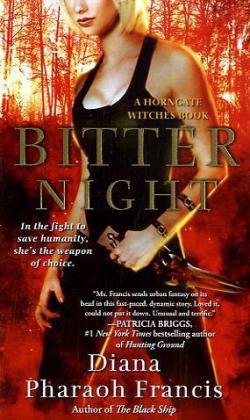
 Bitter Night by Diana Pharaoh Francis
Bitter Night by Diana Pharaoh Francis
In Bitter Night, Diana Pharaoh Francis introduces an unusual urban-fantasy heroine. Max is a Shadowblade, a super-powered warrior bound to serve a witch and her coven. Enslaved against her will, Max has loathed Giselle, her witch, for decades. Yet she finds herself working alongside Giselle, and other unlikely allies, when the Guardians (gods) plan an attack on the human race and threaten to destroy any coven that won’t help them.
What I liked about Bitter Night: First of all, the concept of Shadowblades (and their day-dwelling counterparts, the Sunspears) is unique. Second, I liked the themes of honor, debt, and freedom that Francis explores. Max’s determination to help various characters escape their supernatural bindings reminds me a bit of the ending of Charles de Lint’s Jack the Giant-Killer, which I loved.
Fans of action-packed, high-octane urban fantasy will find a lot to like here. I feel like I’ve just experienced the literary equivalent of a summer blockbuster! Bitter Night features heaps of violence and gore. The gore was maybe a little too much for me. The Shadowblades’ preternatural healing abilities enable Francis to dish out unbelievable injuries to her characters and still have them bounce back. Some of the injuries result from fighting, some from torture. Torture seems to be almost a sport to Francis’ witches. They torture their own Shadowblades for fun and “practice,” and when they want to challenge their rivals, they torture the other witches’ Shadowblades as a form of competition. This is definitely not a book for the squeamish!
The real problem I ran into with Bitter Night, though, is that I felt a little distant from Max. This is in part due to Francis’ unusual decisions regarding point of view. Most urban fantasies are written in the first person, and most of the rest are written in third person but still told exclusively from the heroine’s perspective. Bitter Night is written in the third person, and roughly half of the story is written from the male lead’s point of view.
But there’s also the issue of Max’s fellow Shadowblades. Her loyalty to them, and their devotion to her, is a big part of what makes Max tick. Yet I never felt like I knew these people very well. We learn a lot about Max’s enslavement by Giselle, and a lot about her present-day situation, but not much about the intervening years, during which the bond between Max and her Blades developed. We don’t get much personal backstory about these Blades, either. Since these characters are so important to Max, knowing them better would help the reader know Max better. Perhaps this will happen in the sequels.
The romance didn’t really click with me, either. Don’t get me wrong — Max and Alexander make a great team. I can feel the respect and admiration between them, and it’s clear that they work well as friends and colleagues. But their chemistry doesn’t really come through the page. So whenever one of them had a thought about how attracted they were to the other, it would startle me for a moment, and then I’d think, Oh, right, this is the romantic subplot.
However, I loved Francis’ decision to have Max in a position of authority over Alexander for much of the novel. For a supposedly female-driven subgenre, there are a lot of urban fantasy worlds, and urban fantasy couples, that are male-dominated. This is not one of them!
Bitter Night is an urban fantasy that takes a lot of risks. The results are mixed, but I can unequivocally say that it’s not a carbon copy of anything else I’ve read.







I absolutely loved your insights on Foundryside! The blend of action and character development really struck a chord with me.…
so you're saying I should read it? :)
This blog post beautifully captures the essence of Edwige Fenech's contribution to the giallo genre! Her performances are so captivating,…
As a native New Yorker, I love the idea of the city being filled with canals and no skyscrapers! And…
How did I miss this? Thanks for bringing it to my attention!